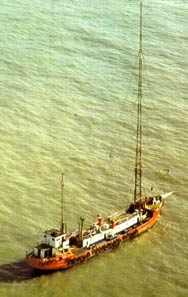The Death of Offshore Radio
From the desk of Luc Van Braekel on Sat, 2006-02-11 00:45

Earlier this week, Sylvain Tack died in his home near Ostend in Belgium. Tack was not only the inventor of the Belgian "Suzy waffle" brand, but also the founder of Radio Mi Amigo, an offshore radio station.
From 1974 to 1978 Radio Mi Amigo was broadcasting to Flanders and the Netherlands. At a time when radio was a state monopoly and programs were strictly non-commercial, Tack brought commercial radio to these countries. Operating from a radio ship anchored in the shallow international waters of the Thames Estuary, Radio Mi Amigo was out of reach from any government jurisdiction. The high seas were the last truly free surface on the planet. As most western European countries had signed the Treaty of Strasbourg in 1965, making it illegal for their citizens to cooperate with or advertize on offshore radio stations, Tack fled from prosecution in Belgium and moved to Spain, where the radio programs were pre-recorded on tape before being carried to the ship.
Radio Mi Amigo operated from the same ship as Radio Caroline, owned by Irish radio pioneer Ronan O'Rahilly. As Dr Madson Pirie from the Adam Smith Institute shows in this remarkable article, Radio Caroline broke the BBC monopoly and helped the Conservative Party defeat the socialist government of Harold Wilson in 1970.
Today, offshore radio has become all but impossible. The United Nations Convention of the Law of the Sea gives governments from countries where broadcasts from offshore radio stations can be received the power to seize the broadcasting equipment, even outside of their territorial waters or their exclusive economic zone. Even on the high seas, freedom has become a relative thing.
